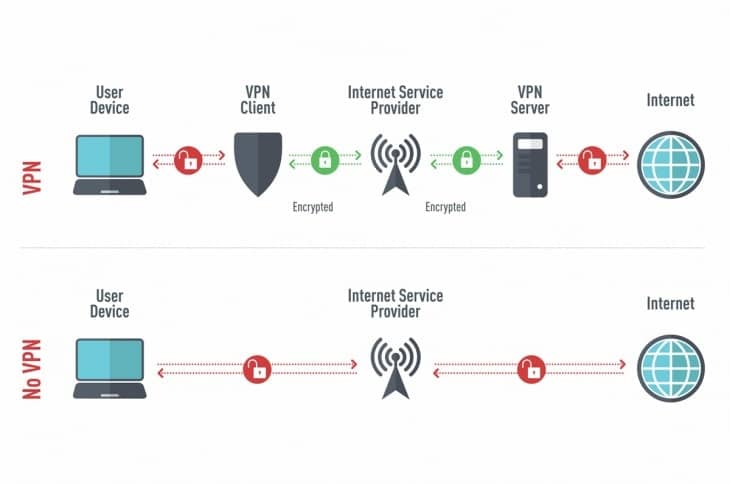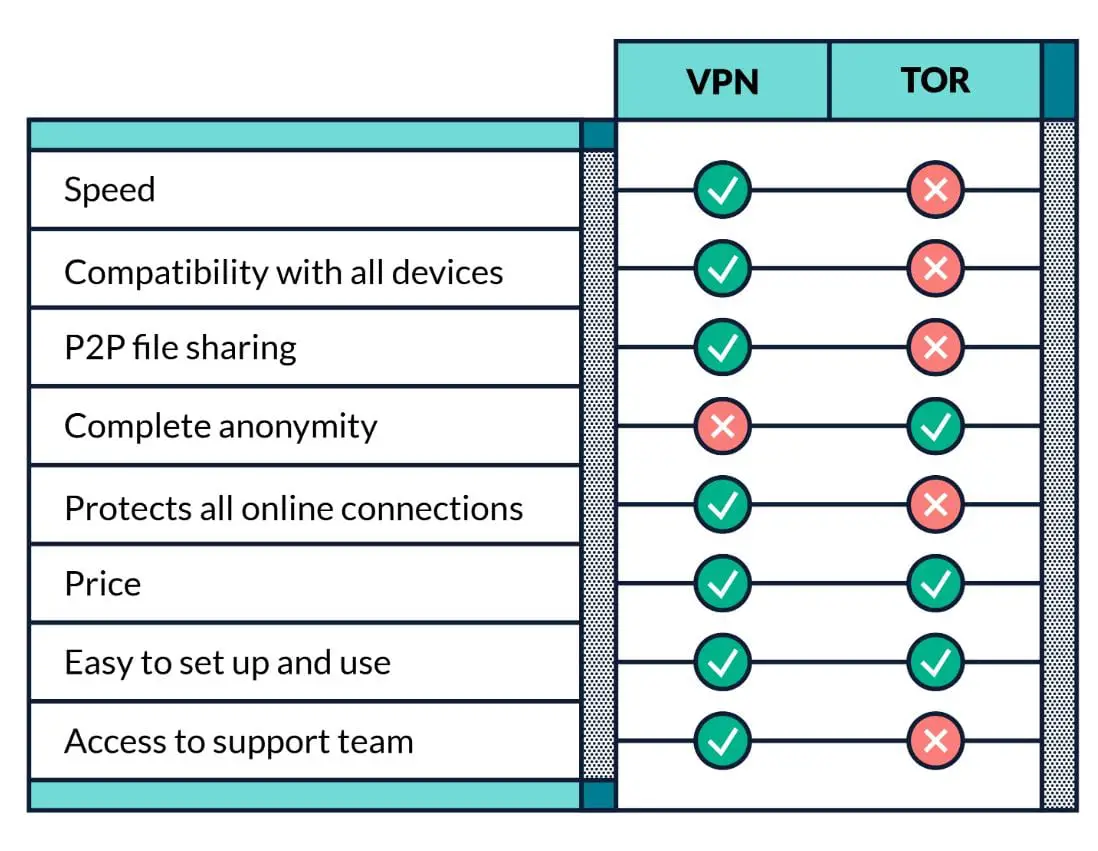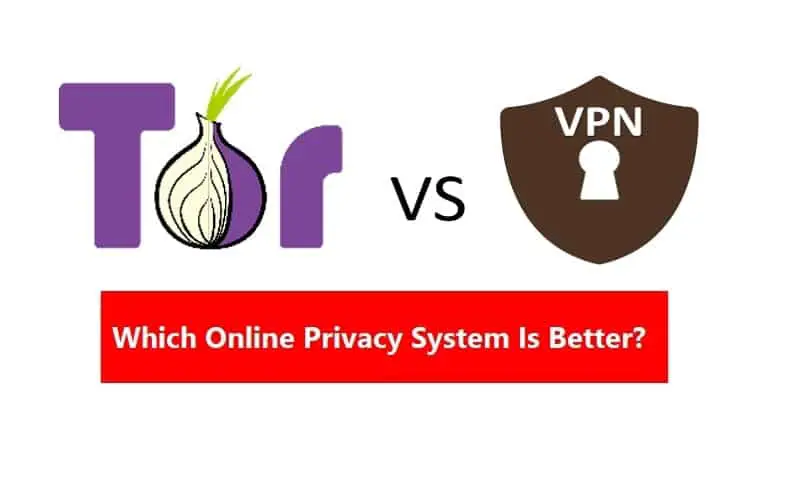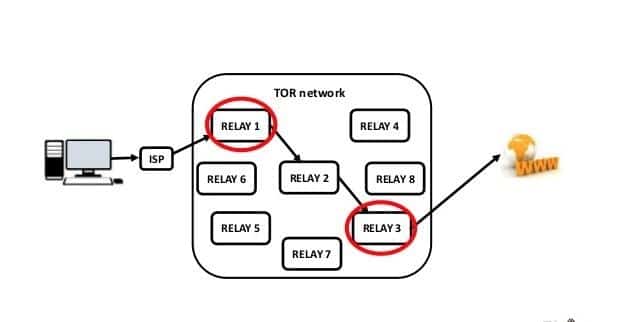When we are talking about online privacy, the first two names that pop up in our mind are – Tor (The Onion Router) and VPNs (Virtual Private Networks). They are the two most powerful online privacy tools that you can use today to secure your online presence. In a way, they are quite similar to one another, But, they aren’t fully alike and have major differences. This article explores the differences between Tor and VPN, which is better of online privacy.
What is a VPN?
Let’s start with VPN! A Virtual Private Network aka VPN is an advanced technology that protects your online privacy when you are connected to the internet by hiding your IP address and encrypting your online interaction.
How Does a VPN Work?
VPN mainly consists of a network of servers which is located in different regions around the globe. When you use a VPN, Information through your computer passes via one of the VPN servers before reaching the final destination over the internet. Here is an image for a better understanding, how your data process with VPN and without VPN.

VPN protocols
VPN protocols ensure an appropriate level of security to connected systems when the underlying network infrastructure alone cannot provide it. There are several different protocols used to secure and encrypt users and corporate data. They include:
- IP security (IPsec)
- Secure Sockets Layer (SSL) and Transport Layer Security (TLS)
- Point-To-Point Tunneling Protocol (PPTP)
- Layer 2 Tunneling Protocol (L2TP)
- OpenVPN
Advantages of using VPN
Using the VPN service, you can experience the following benefits –
- VPN protects your server from the eyes of spies as the messages transferred using VPN are encrypted before passing between the servers and your computer.
- Users can access content blocked in their region by connecting to servers in different locations.
- Most VPN services are easy to install and use. With the simple installation of wizards, you can easily download and configure your software.
- The services provided by top VPN services are compatible with all popular devices such as Windows, iOS, Android, and Linux operating systems.
Disadvantages of VPN
VPNs are a great way to secure your online presence, but it has some shortcomings which can’t be completely ignored.
- To protect your data, the VPN server has to work properly. But, if a server fails during your season, then messages from your system will be sent unencrypted which will a huge danger to your privacy.
- You have to trust the logging policies of your VPN server as you are using their software for protection. But, some of the VPN service providers won’t have a clear login policy which is very dangerous for you.
- For the protected communication between your computer and the VPN server, unbreakable encryption is required. But, if the encryption is weak, then you cannot have encrypted communication.
What is Tor?
At first look, the Tor (The Onion Router) looks similar to the VPN as Messages between the computer pass through the Tor network instead of connecting it directly to the resources on the internet. But, the difference here is that VPN offers privacy whereas Tor gives complete anonymity.
Tor is also known as the Onion Router because it uses many encryption layers and network relays to keep your identity a secret from any third parties.
VPN servers keep a tab on your online activities and you can’t feel complete privacy over the VPN and you have to trust the logging policies of the service providers. But, when you are using Tor, then you won’t have to trust anyone. The structure of the Tor is designed to make you virtually anonymous. However, no system is 100% foolproof, but Tor is up close to the perfect.
How does Tor work?
Tor uses Onion Routing and even more complex approach to encrypting your messages. Onion Routing requires the message to pass through at least three, randomly-selected Tor servers before it gets sent to its final destination. Before the message leaves your computer, the Tor software encrypts the message multiple times. This security system is similar to the layers of the onion where you have to cross multiple exterior layers to reach the final layer.
Advantages of using Tor
Before using the Tor make sure to read out its advantages.
- It is made up of thousands of servers that are spread all over the world so it is very difficult to shut down the Tor. If one network is disturbed, then others will keep on working as nothing is centralized.
- Tor allows users to access .onion websites, which are not indexed by traditional search engines.
- Tor is a very safe place as a large community is always working to improve the performance of the Tor. However, no one can guarantee you 100% anonymity, but Tor can provide you more anonymity, than VPN any day.
Disadvantages of using Tor
Tor is a powerful and anonymous network, but it has some limitations which can’t be ignored.
- The message before the transmission has to go through three or more widely spread servers and get encrypted and decrypted for at least three times which results in slow speed.
- Tor is operated by a bunch of volunteers so there’s no built-in source to pay for the maintenance and up-gradation of the network. Some servers on the network are old and have a bad internet connection.
- Tor is maintained on Android devices and presently Tor browser isn’t available for iOS which means it is not compatible with iPhones and iPad.
Difference between Tor and VPN
TOR
Tor does provide anonymity, because your Internet activity is routed through thousands of dedicated Tor servers around the world, making it hard for anyone to trace activity back to your computer.
The Tor network, however, does not take extra measures to protect your data from hackers. It just routes your data so it’s more or less untraceable.
Going on some of the websites that are on Tor could easily infect your computer with malware. In fact, many people would advise you not to go exploring many websites on Tor.
VPN
With a VPN account, your Internet browsing experience is identical to what it always is. You simply have your activity tunneling through the VPN’s network of servers around the country or around the world.
When using your VPN account, your real IP address is always hidden. Your IP address cannot be blocked, traced or tracked.
A VPN doesn’t replace your Internet Service Provider. It works with your ISP and the Internet by creating a special tunnel in which your data travels safely. A VPN is essentially a data network inside another network (the Internet) that hackers can’t get to.

Recommend: What Is The Difference Between A VPN And A Proxy and how they work?
Should I use VPN and TOR simultaneously?
Yes, you can use both Tor and VPN at the same time. But VPN is generally faster than Tor, using them together will slow down your internet connection and should be avoided. More is not necessarily better in this situation.
Tor and VPN which one is for you?
If you are more concerned about your online identity then TOR is better but if you prefer good speed, P2P file sharing, and Access to support team you can go with VPNs. There are several benefits of choosing a VPN, including:
- Speed: VPNs are generally faster than Tor since messages pass through only one VPN server instead of 3 Tor nodes.
- Compatibility with all devices: VPNs work with a wider range of devices than Tor. In particular, as of today, Tor does not work with Apple’s iOS. If you use an iPhone or iPad, Tor is not an option.
- P2P file sharing: VPNs are better suited for P2P file sharing or watching videos.
- All online connections protected: A VPN will protect all your Internet connections; Tor only protects those designed to use the Tor network.
- Easy to set up and use: VPNs are extremely easy to set up; all you have to do is download the software onto your computer and run it whenever you need to be protected.
- Access to support team: Because VPN providers are major companies, they have helpful FAQ pages, as well as support teams should you run into any problems.
If speed is crucial, VPNs are generally faster than Tor, making them more suitable for activities requiring a faster internet connection.
Now, you are familiar with the working, advantages, and disadvantages of both VPN and Tor so you can easily make a sure decision. I hope this quick comparison between VPN vs Tor will also give you the right grounds to make a good decision.
Also read:

